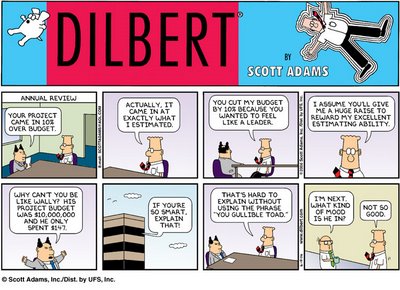Dilbert as a math lesson
A feature in my editing class, "Editing the Comics," helps impart some of the issues of usage, spelling, etc., in a more lighthearted way. (Before you get on my case, I know the comics use dialect and don't have to conform to AP style, etc. But it doesn't mean things such as false series, misuse of lay/lie, etc., still can't be used as examples.)
Sunday's Dilbert gives us a good example of another problem, this one numeracy --the problem of the shifting base. Every copy editor should know this so we don't get silly stuff like a recent story that told us the stock market was down x percent and had to make up that same x percent to get back to where it was.
Once something goes down x, the new base is the orignal number less x. Any percentage difference to make up the lost ground must be higher than the original decrease. (Try it: If the market goes down 20 percent, you're now at 80. If it goes back up 20, that's 20/80, or 25 pecent, not 20 percent. A 20 percent increase would only get you back to 96.)
So today's quiz: If Dilbert is right and his project came in exactly as he had estimated, and if the boss cut the original budget 10 percent, then his project actually came in _____ percent over budget (to one decimal place). The answer is below the comic:
 Dilbert's budget must have come in 11.1 percent over what the boss had cut it to.
Dilbert's budget must have come in 11.1 percent over what the boss had cut it to.Simple calculation: If Dilbert's original budget was 100 (always the best number to start with in these percentage calculations), then the boss cut it to 90. But if it actually came back in at 100, the difference is 10/90 (or 1/9), which equals 11.1.
Always beware the shifting base and its cousin, compounding. (For instance, a wage increase of 5 percent the first year and 3 percent the next is not 8 percent total. It's 8.15 percent -- after the first year, the person is making 1.05, so the 3 percent applies to that (1.05*1.03). That might not seem like a siginifcant difference to the average wage earner, but when you start talking about overall labor costs to a company, it's not chump change.)
And in this election season, be very scared of politicians using numbers.
2 Comments:
Still a funny strip but I noticed this error as well. Maybe Scott Adams even knew it was incorrect. It doesn't sound very funny for Dilbert's boss to say his project came in 11.1 percent over. The mathematically disinclined readers (everyone save copy editors and mathematicians) would be left scratching their collective heads.
Well, no, and that was the point of my initial disclaimer. For Adams to have written that would have been dumb.
But it does make a good teaching tool, as do a lot of similar things in the comics -- a lot better than dry text examples.
Post a Comment
<< Home